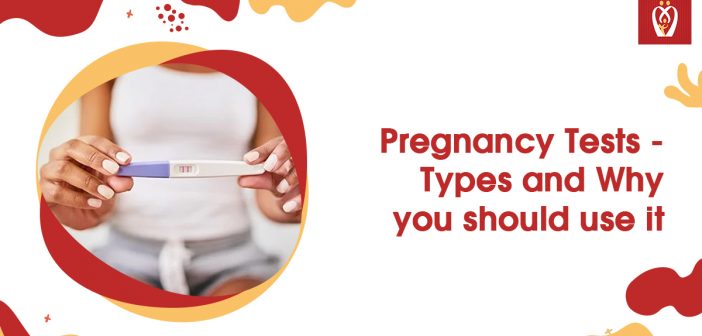Pregnancy tests measure the levels of hCG in your bloodstream to determine if you are pregnant. After discovering you’re pregnant, your body undergoes a series of physiological changes to help facilitate the development of the cell clusters that will one day become your child. A lot happens in a short period of time when hCG is being made. After conception, when the fertilised egg implants in the uterus, this substance is only found in pregnant women and begins to build up around 10 days later.
Urine testing and blood testing are the two types of pregnancy tests available. At your convenience, urine tests can be done with a home pregnancy test kit like the Tesco pregnancy test kit or the Clear Blue pregnancy test kit. An over-the-counter test like this does not require a GP’s prescription, as you can buy it over the counter for a variety of prices.
Pregnancy tests can be used for a variety of reasons. There is a possibility that you are trying to conceive and are hoping that it will work out. There’s a chance your method of birth control malfunctioned. Pregnancy can make it more difficult to undergo a medical procedure or begin taking a new medication. Please consult your GP if you have any concerns or questions about your test results, regardless of the reason. If there is a false positive on pregnancy test, an ultrasound may reveal this as well. An ultrasound can be used later in pregnancy to check on the baby’s appearance as well as its development timeline to ensure that the baby’s growth corresponds with the dates of your conception and missed period.
In what ways can a woman tell if she’s pregnant?
The most common ways to find out if you’re pregnant are through urine and blood tests. Urine tests are typically done at home, but your GP’s office may be able to perform one for you.
Pregnancy test in the comfort of your own house
A urine hCG test is the most commonly used at-home pregnancy test in the majority of cases. Pregnancy tests performed at home are said to be 99 percent accurate when done according to the directions. This test is comparable to the 99% accuracy rate of urine pregnancy tests performed in the GP’s office. The majority of pharmacies and supermarkets sell these tests without a prescription. They may take longer or shorter depending on the brand. Make sure you’ve read the instructions before taking any of these tests.

To perform an at-home pregnancy test, you must place a few drops of pee on or directly into a chemical strip. The strip was specifically designed to detect hCG. The hCG hormone first appears in your urine about 10 days after conception, making the timing of these tests critical. However, if taken after a missed period, the risk of a false-negative result is reduced.
When taking home pregnancy tests, keep in mind the following:.
- Use fresh morning pee whenever possible. This is the time of day when your hCG levels are at their peak, making it easier for you to detect the change. Remind yourself to wait at least four hours after urinating before performing any of the aforementioned procedures.
- Avoid drinking a lot of water before taking a pregnancy test. If you’re concerned about diluting your hCG, you may want to avoid this method.
- Make certain you’ve read the instructions and followed each step exactly before taking the test.
A blood test to detect pregnancy
Pregnancy can also be detected through a blood test. People avoid blood tests because they are expensive and the results are often the same as a urine test. With this pregnancy test, GPs draw some blood from a patient’s arm and analyse it for the presence of hormones. Pregnancy hormone levels can be determined with the help of this blood test.
As part of infertility treatments for women or when a healthcare professional suspects there may be an issue, a blood test for pregnancy may be done.
As a result, these tests are more sensitive than urine tests in detecting hCG levels. They should be able to give a more specific answer between nine and twelve days after conception. A lab analyses your blood sample when you take this test. Your results may take anywhere from a few hours to up to a day.
Your GP may also use an hCG blood test to compare your hCG levels at various points in your pregnancy. A normal increase in hCG occurs every two days in the first few weeks of pregnancy. There may be something wrong with the baby if the levels don’t rise. There may be something wrong with your pregnancy if your hCG levels are abnormally high.
When is the best time to find out if you’re expecting?
To be on the safe side, if you think you might be pregnant, take a pregnancy test. If you are expecting a child, you must begin prenatal treatment immediately. To some extent, this depends on how early in the cycle the woman takes the home pregnancy test. At-home tests for pregnancy can be used as early as 10 days after conception to detect a pregnancy. Tests are more accurate after a missed period. Taking the test too soon could result in a negative result, even if you are indeed pregnant. Make an appointment with your GP or take another pregnancy test if you fail a pregnancy test and don’t show up for your period after the first one.
Benefits of home pregnancy tests
The following are some of the advantages of using a home pregnancy test:
- Low in price.
- Easy to work with.
- Results from home testing can be accessed in a short period of time.
According to the manufacturers, most at-home pregnancy tests are 97% to 100% accurate when used as directed. False negative pregnancies can occur early in the course of pregnancy.
The cost of blood testing and the length of time it takes to get an appointment are major deterrents for many women. You can find out if you’re pregnant within a few days of conception with home tests.
Medications have an impact on prenatal testing
Medication has little effect on pregnancy test results. A blood test result will not be affected if you are taking antibiotics, birth control, or alcohol. The most common reason for a false-negative test result is that the test was performed prematurely. Using a home test incorrectly could lead to an incorrect negative result. Follow the instructions carefully if you want an accurate reading from your test kit.
However, the use of reproductive medications is an exception. If you take certain drugs, your pregnancy tests may be falsely positive. Users of fertility medicine should seek the advice of a healthcare professional to ensure that their test results are accurate.
What should I do after a positive result?
If you get a positive pregnancy test result at home, there are a few things you need to do.
- Ensure that you are taking a prenatal vitamin that contains the B vitamin folic acid. Take these vitamins as soon as you find out you’re pregnant and continue taking them throughout the rest of your pregnancy. This is a positive development since it may help prevent birth defects.
- By calling your healthcare provider, you can schedule an appointment with your GP. You should make an appointment with your GP for this checkup, even if it’s a few weeks in the future.
- Maintain a healthy diet and exercise routine. It is generally recommended that women who are pregnant abstain from both alcohol and tobacco use. Pregnant women should limit their intake of caffeine, as it has been linked to birth defects.
Finally, now is the right time to download the Nurturey Pink Book app. The Pink Book keeps track of your timeline, your health, and even schedules appointments with your GP! Learn more at https://www.nurturey.com/







